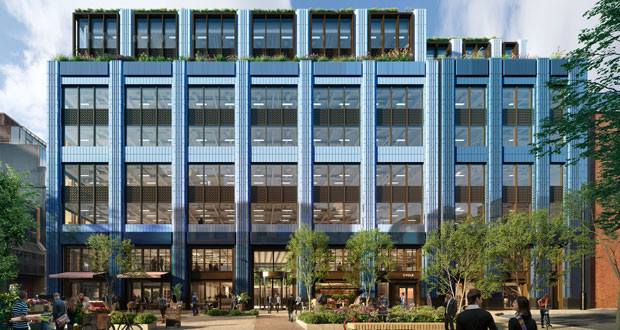A new office development in the heart of Shoreditch in London that set itself challenging sustainability standards in both construction and operation has completed and is already set to be fully occupied on opening.
Set over eight floors and 13,000 square metres of leasable space, Worship Square is one of the most sustainable buildings to date from international workspace provider HB Reavis. It was designed by Make Architects and delivered by JMA Architects and Buro Happold. From the outset, it was envisioned with embodied carbon targets more than 50 per cent lower than the UK Green Building Council (UKGBC) 2020 baseline, and 18 per cent lower than the 2030 GLA (Greater London Authority) aspirational benchmark.
The goal was to create an extremely energy efficient, future-proof building that was as easy as possible for occupiers to operate. Worship Square is targeting a BREEAM score of ‘outstanding’, a 5* NABERS rating and a Platinum WELL certification. It has already achieved both a platinum WiredScore and SmartScore, as well as an EPC rating of A.
To meet the challenging ambition of a 5* NABERS rating, Buro Happold worked closely with the manufacturers and the contractors. With very little room for discrepancy, it was essential everything was properly described and analysed, and then measured and tested throughout construction.
Energy efficient features built into the design of Worship Square include heating and cooling from its air source heat pumps, onsite photovoltaics, and high-performance façade. Occupiers can monitor medium and low voltage electricity, heat, LTHW (low temperature hot water), chilled water and fuel oil usage and leak detection, helping to closely control and lower operational emissions.
Smart technology will be used for the operation of the building, which includes managing the environmental conditions as well as functions such as booking meeting rooms. Environmental factors such as carbon dioxide levels, temperature and light level can all be controlled to provide the optimal environmental conditions, and occupiers can easily see what the ideal ranges are and adjust the settings accordingly.
Air quality is monitored by sensors which detect the carbon dioxide concentration and humidity levels and pump in fresh air from outside when they fall outside the optimum range. Before entering the building, it passes through air handling units that provide full outside air treatment with the provision for carbon filter installation.
As well as its impressive sustainability credentials, Worship Square’s design aims to prioritise occupier wellbeing and a sense of community, with over 4,500 square feet of private and communal roof terraces, including a communal vegetable garden.
Other wellbeing features include a fitness studio, an app-controlled concierge service, in-house bookable Brompton bicycles and parking for up to 325 bicycles, and a ‘living lobby’.
Its occupiers have been closely involved in modifying the design of the spaces so that they are fit for their exact needs. The office areas are not divided by structural walls so occupants have the capability to grow and adapt their space to accommodate expansion, and there are several on-demand workspaces that can be rented on a ‘pay-as-you-go’ basis for one-off meetings and events, including Ready to Work and HB Reavis’ co-work brand HubHub marking its second London location. Ten per cent of space will provide workspace for local businesses, and Worship Square also includes 300 sq. m of ground floor retail space.
Buro Happold’s MEP and Sustainability teams have delivered some of the most sustainable buildings in the UK and across the globe, including the Co-operative headquarters, One Angel Square in Manchester, which obtained the highest ever BREEAM Outstanding score in the UK at the time of certification.
Frontline workers form the backbone of facilities management services, serving as the face of the brand and interacting directly with customers. Yet research by both L&G and the Living Wage Foundation reveals the majority feel overlooked and expendable.
Accelerating the problem is a growing technology gap. Despite having 2.7 billion deskless workers worldwide, representing 80 per cent of the global workforce, only one per cent of software and technology investments has been allocated to this segment. This means there is a huge disconnect between frontline workers and their headquarters, leading to lack of sufficient training, communication challenges and low employee retention.
For this webinar, FMJ has teamed up with frontline training platform Lingio to bring together a panel of experts, to discuss how easy-to-use and efficient AI tools can help create engaging and gamified learning experiences that fit the needs of underserved deskless workers. The result? Better software and learning experiences lead to improved staff engagement and reduced staff turnover by up to 95 per cent, according to McKinsey.
To register for the webinar taking place on 11 September at 11:00 am click here.





